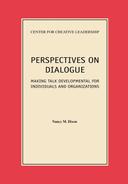There is a growing sense today that organizations and the people that make them up are, to repeat a figure of speech recently used by Robert Kegan (1994), in over their heads. As diversity becomes the rule and change the sole constant, complexity is increasing. The only effective response to this complexity is development: both at the individual level and at the organizational level.
Consequently, a great deal of effort is now being devoted to individual and organizational development. One developmental activity, which is much practiced but imperfectly understood, takes place at the intersection between these levels: talk.
Not all talk is developmental, of course. In this paper I will first discuss the relationship between talk and development in organizations, looking at the basic ways that developmental talk—or, as it is often referred to, dialogue—differs from the skilled talk that goes on all the time. I will next summarize five perspectives on dialogue as offered by leading theorists, and then make a series of practical observations based on these views. Finally, I will review some examples of how dialogue has been incorporated into the work processes of organizations.
This paper is meant primarily for human resources professionals and practicing managers who are responsible for individual and organizational development, but it should also be of interest to anyone who is concerned with development.
